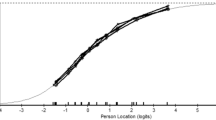Abstract
Multiple sclerosis (MS) has a major impact on quality of life (QoL). Coping strategies which may influence QoL have not been identified. Furthermore, there is no coping scale designed to measure coping in MS patients and concise enough for routine medical practice. We used 46 items and 7 coping dimensions; we successively reduced the minimum number of dimensions through confirmatory factor analysis (CFA) and Rasch modelling. The resulting scale was submitted to psychometric validation via an independent cross-sectional analysis. After administration to 331 MS patients, we eliminated 10 of the 46 initial items; a CFA iterative algorithm identified a positive coping (PC) group and a negative coping (NC) group; an iterative reduction algorithm led to a final 10 items questionnaire, which was tested in an independent, new cross-sectional sample of 457 patients. Psychometric tests, including the Rasch model and CFA, successfully validated the scale, confirming the two dimensions and the absence of differential item functioning. The correlation between coping and QoL increased to 0.59 and 0.62 for NC and PC, respectively, compared with 0.33 found with existing scales. Our findings justify a one-dimensional overall coping scale (PC + NC). The effect of coping on QoL can be evaluated simply by adding together a positive and a negative coping strategy, for which we developed a short 10-item scale, which can be considered as an effective means of measuring the impact of coping on QoL and is ideal in routine medical practice.

Similar content being viewed by others
References
Benito-Leon J, Mitchell AJ, Rivera-Navarro J, Morales-Gonzalez JM (2013) Impaired health-related quality of life predicts progression of disability in multiple sclerosis. Eur J Neurol Off J Eur Fed Neurol Soc 20:79–86
Lazarus RS (1974) Psychological stress and coping in adaptation and illness. Int J Psychiatry Med 5:321–333
Lode K, Bru E, Klevan G, Myhr KM, Nyland H, Larsen JP (2010) Coping with multiple sclerosis: a 5-year follow-up study. Acta Neurologica Scandinavica 122:336–342
Lynch SG, Kroencke DC, Denney DR (2001) The relationship between disability and depression in multiple sclerosis: the role of uncertainty, coping, and hope. Mult Scler 7:411–416
McCabe MP, McKern S (2002) Quality of life and multiple sclerosis: comparison between people with multiple sclerosis and people from the general population. J Clin Psychol Med Set 9:287–295
Goretti B, Portaccio E, Zipoli V, Hakiki B, Siracusa G, Sorbi S et al (2009) Coping strategies, psychological variables and their relationship with quality of life in multiple sclerosis. Neurol Sci Off J Ital Neurol Soc Ital Soc Clin Neurophysiol 30:15–20
Devy R, Lehert P, Varlan E, Genty M, Edan G (2013) A short and validated multiple sclerosis-specific health-related quality of life measurement for routine medical practice. Eur J Neurol Off J Eur Fed Neurol Soc 20:935–941
Endler NS, Parker JDA, Summerfeldt LJ (1998) Coping with health problems: developing a reliable and valid multidimensional measure. Psychol Assess 10:195–205
Vitaliano PP, Russo J, Carr JE, Maiuro RD, Becker J (1985) The ways of coping checklist: revision and psychometric properties. Multivar Behav Res 20:3–26
Amirkham JH (1990) A factor analytically derived measure of coping the coping strategy indicator. J Person Soc Psychol 59:1066–1074
Endler NS, Parker JDA (1990) Multidimensional assessment of coping: a critical evaluation. J Person Soc Psychol 58:844–854
Rosenthiel AK, Keefe FJ (1983) The use of coping strategies in chronic low back pain patients: relationship to patient characteristics and current adjustment. Pain 17:33–44
Carver CS, Scheier MF, Weintraub JK (1989) Assessing coping strategies: a theorectically based approach. J Personal Soc Pyschol 56:267–283
Perrez M, Reicherts M (1992) Stress, coping and health. Hogrefe & Huber Publishers, Seattle, WA
Montel SR, Bungener C (2007) Coping and quality of life in one hundred and thirty five subjects with multiple sclerosis. Mult Scler 13:393–401
Pakenham KI (1999) Adjustment to multiple sclerosis: application of a stress and coping model. Health Psychol Off J Div Health Psychol Am Psychol Assoc. 18:383–392
Mair P, Hatzinger R (2007) Extended rasch modeling the eRm package for the application of the IRT models in R. J Stat Softw 20:1–20
Andersen EB (1973) A goodness of fit test for the Rasch model. Psychometricka 38:123–140
McCabe MP, Firth L, O’Connor E (2009) A comparison of mood and quality of life among people with progressive neurological illnesses and their caregivers. J Clin Psychol Med Set 16:355–362
Schwartz CE (1999) Teaching coping skills enhances quality of life more than peer support: results of a randomized trial with multiple sclerosis patients. Health Psychol Off J Div Health Psychol Am Psychol Assoc 18:211–220
Conflict of interest
No conflict of interest was declared.
Author information
Authors and Affiliations
Corresponding author
Rights and permissions
About this article
Cite this article
Devy, R., Lehert, P., Varlan, E. et al. Improving the quality of life of multiple sclerosis patients through coping strategies in routine medical practice. Neurol Sci 36, 85–90 (2015). https://doi.org/10.1007/s10072-014-1900-8
Received:
Accepted:
Published:
Issue Date:
DOI: https://doi.org/10.1007/s10072-014-1900-8




